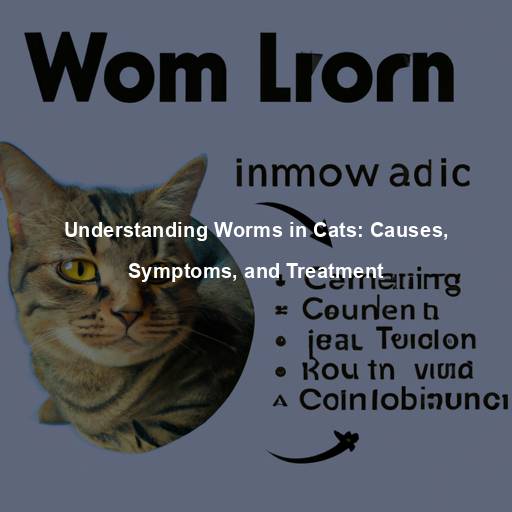Understanding Worms in Cats: Causes, Symptoms, and Treatment
Last Updated on July 13, 2023 by Evan
Contents
- 1
- 2 What are Worms?
- 3 How Do Cats Get Worms?
- 4 Common Types of Worms in Cats
- 5 Symptoms of Worm Infestation
- 6 Diagnosing Worm Infestations
- 7 Treatment Options for Worms
- 8 Preventing Worm Infestations
- 9 Natural Remedies for Worms in Cats
- 10 Understanding the Importance of Hygiene
- 11 Seeking Veterinary Guidance
- 12 FAQs about Why Cats Get Worms
- 12.1 Q: How do cats get worms?
- 12.2 Q: What are the common types of worms that cats can get?
- 12.3 Q: What are the symptoms of worms in cats?
- 12.4 Q: Can worms in cats be harmful to humans?
- 12.5 Q: How can I prevent my cat from getting worms?
- 12.6 Q: How often should I deworm my cat?
- 12.7 Q: Are over-the-counter dewormers effective for cats?
Feline worms, a perplexing predicament that often befuddles cat owners, can pose a threat to the well-being of our beloved feline pals. These pesky parasites, shrouded in mystery, have the potential to wreak havoc on our cats’ health and happiness. In our quest to unravel the enigma surrounding these creepy crawlies, we will embark on an informative journey, shedding light on their origin, the telltale signs of their presence, and the bewildering array of treatment options available. By arming ourselves with knowledge, we can navigate the labyrinth of worm infestations and safeguard the vitality of our furry companions.
What are Worms?
### Unwanted Guests in the Feline World
Worms, also referred to as intestinal parasites, are organisms that live and reproduce inside the digestive system of cats. These parasites can vary in size, shape, and species, but all share a common goal – to exploit the nutrients from their host and survive. While there are different types of worms that can infect cats, some of the most common ones include roundworms, tapeworms, hookworms, and whipworms.
How Do Cats Get Worms?
### Uncovering the Sources of Infection
As cat owners, we know that keeping our feline friends happy and healthy is our number one priority. However, the world of worms can be a perplexing and worrisome one. The sources from which our beloved cats can acquire these unwanted guests are as varied as they are bursty. From feasting on infected prey to coming into contact with contaminated soil, the possibilities are enough to make any cat owner’s head spin.
- Ingesting Infected Fleas: Fleas can act as intermediate hosts for certain types of worms. When cats groom themselves and accidentally swallow fleas, they may also ingest the larvae of these parasites.
As our feline friends embrace their natural instincts as skilled hunters, they sometimes encounter a perplexing dilemma. It has been observed that outdoor cats, in their pursuit of prey, may unknowingly consume rodents, birds, or other unsuspecting creatures that harbor worm larvae. This unforeseen encounter between predator and infected prey can leave our beloved feline companions vulnerable to infections and raise concerns for their well-being.
-
Mother to Kitten Transmission: Kittens can become infected with worms through their mother’s milk or during the birthing process. This is why deworming protocols are essential for newborn kittens.
-
Contaminated Environment: Cats that come into contact with contaminated soil, feces, or water sources can pick up worm eggs or larvae, leading to infestations.
Common Types of Worms in Cats
### Unraveling the Worm World
To effectively combat worms, it is crucial to identify the specific type of worm affecting your cat. Let’s take a closer look at the most common types of worms in cats:
-
Roundworms: These are the most prevalent internal parasites in cats. They resemble spaghetti and can grow up to several inches in length. Kittens are particularly susceptible to roundworm infections.
-
Tapeworms: Tapeworms are long, flat parasites composed of multiple segments. They attach themselves to the cat’s intestines and shed segments containing eggs in the feces, which can be seen as small rice-like grains near the anus or in the cat’s bedding.
Unveiling the enigmatic world of hookworms, these minuscule creatures exhibit a bewildering array of adaptations with their hook-like mouthparts delicately entwined with the intestinal lining, stealthily siphoning blood as their source of sustenance. Provoking perplexity in the medical realm, hookworm infestations elicit a cascade of health complications, including the insidious onset of anemia. Truly a testament to the intricate wonders of the natural world, these tiny, yet astonishing, worms captivate our imagination and inspire endless curiosity.
- Whipworms: Whipworms are less common but can still affect cats. They reside in the large intestine and can cause symptoms such as diarrhea, weight loss, and lethargy.
Symptoms of Worm Infestation
### Deciphering the Clues
Spotting a worm infestation in your beloved cat can prove to be a perplexing task, given the multitude of symptoms that can manifest based on the specific type of worm and the gravity of the infection. Nonetheless, there are a few shared indicators to keep an eye out for:
-
Visible Worms: In some cases, you may notice worms in your cat’s feces or vomit. While this is a strong indicator of an infestation, it is not always visible.
-
Gastrointestinal Disturbances: Cats with worms may experience diarrhea, constipation, vomiting, or a combination of these symptoms. Changes in appetite and weight loss can also occur.
One of the potential consequences of worms in a cat’s digestive system is the emergence of a pot-bellied or bloated appearance. This perplexing condition can occur due to the presence of these parasites. It’s important for cat owners to be aware of this possibility and take prompt action to address any potential worm infestations, as they can lead to a burst of health issues in our feline friends.
- Dull Coat and Poor Overall Condition: Worms can deprive cats of essential nutrients, leading to a dull coat, lethargy, and a generally unhealthy appearance.
Diagnosing Worm Infestations
### Seeking Professional Assistance
When it comes to our feline friends, the last thing we want is them to suffer silently. If you have a hunch that your beloved cat might be dealing with some unwanted guests in the form of worms, it’s time to take action. Don’t fret, though – finding the right expert to guide you in this perplexing matter is the key. Veterinary professionals possess the knowledge and tools required to unravel the mystery behind these creepy crawlies and offer tailored solutions to tackle them head-on.
When it comes to identifying the presence of worms in your furry friend, a skilled veterinarian will employ a range of diagnostic techniques. These may include thorough physical examinations, analyzing stool samples under a microscope, conducting blood tests, or even utilizing advanced imaging technologies. By performing these varied assessments, your vet can effectively determine the type and severity of the worm infestation, enabling them to develop a tailored treatment plan for your beloved pet. So, rest assured that your four-legged companion’s health is in capable hands, as your vet navigates the intricacies of diagnosing and addressing this perplexing issue.
Take a deep dive into your feline companion’s health by opting for a fecal examination. This intriguing procedure involves meticulously scrutinizing a minuscule sample of your cat’s excretions, amplifying the perplexity of ensuring their well-being. Embark on a microscopic journey as experts unveil the secrets hidden within, identifying the potential presence of worm eggs or larvae, adding an extra layer of burstiness to your fur baby’s diagnostic experience.
During your cat’s visit to the vet, expect them to undergo a comprehensive physical examination that will leave no stone unturned. The experienced veterinarian will meticulously inspect your furry friend, searching for any additional indications of infestation or any potential health concerns that may be interconnected. Rest assured that this thorough evaluation aims to provide your beloved companion with the highest level of care and uncover any hidden perplexities that may be affecting their well-being.
Treatment Options for Worms
### Eliminating the Intruders
When it comes to tackling those pesky worms in our furry feline friends, we have a whole arsenal of strategies up our sleeves. From powerful deworming medications to proactive preventive measures, we’re leaving no stone unturned. Trust us, we’ve got a tailored treatment plan in store for every worm type and every level of infestation – because beating these critters requires a mix of cunning and persistence. Let’s dive into the world of worm-wrangling together!
- Prescription Medications: Your vet may prescribe antiparasitic medications in the form of tablets, spot-on treatments, or injections. These medications target and eliminate the specific type of worm affecting your cat.
When it comes to deworming, the story doesn’t always end with a single dose. Some pesky parasites have complex life cycles that demand a follow-up treatment to totally eradicate every stage of their existence. So, don’t let your guard down too soon – a second round of deworming might be the key to keeping those creepy crawlies at bay for good. Stay vigilant and stay worm-free!
Maintaining a clean and healthy living space for your feline companion is a crucial step towards minimizing the chances of recurring infections. Regularly attending to litter boxes and bedding, coupled with the prompt disposal of feces, contributes to a hygienic environment that can decrease the risk of reinfections. By adopting these conscientious cleaning practices, you prioritize the well-being of your beloved cat and create a refreshing oasis of tidiness and tranquility.
Ensuring the well-being of our feline companions requires us to stay one step ahead of potential threats. In the realm of pesky parasites, our vigilant veterinarians propose a strategic approach to safeguarding your beloved cat. By adhering to a tailored regimen of flea control and routine deworming, we can proactively shield our furry friends from any future infestations that may attempt to invade their lives.
Preventing Worm Infestations
### Shielding Your Feline Friend
Prevention is always better than cure when it comes to worm infestations. By implementing the following preventive measures, you can minimize the risk of your cat contracting worms:
-
Regular Veterinary Check-ups: Schedule routine visits to your veterinarian to monitor your cat’s health and receive guidance on preventive care.
-
Flea Control: Use veterinarian-recommended flea control products to prevent fleas, as they can serve as intermediate hosts for certain types of worms.
Keeping your furry friend’s living space squeaky clean is key! Make sure to consistently tidy up your cat’s litter boxes, bedding, and toys to ensure a fresh and tidy environment. Don’t forget to prioritize your own hygiene too – after handling any soil or feces, remember to thoroughly wash your hands. Stay vigilant and keep it clean for a happy and healthy cat!
Protect Your Feline Friend: We all know that our beloved cats have an innate hunting prowess, but did you know that controlling their encounters with prey can play a vital role in keeping them worm-free? By wisely choosing to either keep them indoors or closely monitoring their outdoor adventures, you can minimize the chances of them developing a worm infestation. It’s a small effort that can yield big rewards for your furry companion’s health and well-being.
### Safeguarding Your Cat’s Health
Maintaining the well-being of our precious feline friends involves more than just cuddles and toys. As perplexing as it may sound, our fur babies can harbor internal hitchhikers without giving away the slightest sign. That’s where the perplexity lies – these wily worms can silently invade their delicate systems, causing potential harm. To tackle this issue with utmost responsibility, the undisputed experts of the veterinary realm highly recommend adhering to a steadfast deworming routine.
Startling Fact: Did you know that your cuddly companion could be at risk of worm infestations? Stay ahead of the game with a preventive measure that will leave you and your feline friend feeling bewilderingly secure. By administering deworming medications on a regular basis, you can perplex those potential parasites and keep your furry pal’s health in top-notch condition. Say goodbye to worms and hello to peace of mind!
-
Protecting Public Health: Some types of worms, such as roundworms, can be transmitted from cats to humans. Regular deworming helps protect not only your cat’s health but also the well-being of your family and community.
-
Maintaining Optimal Health: Worm infestations can compromise your cat’s immune system and overall health. By deworming regularly, you can ensure that your feline friend remains in the best possible condition.
Natural Remedies for Worms in Cats
### Exploring Alternative Approaches
When it comes to our feline companions, keeping them healthy and free from worms is a top priority for cat owners. While traditional deworming medications are effective, some cat lovers may be intrigued by the idea of exploring natural remedies. Although it’s important to note that natural remedies should never replace professional veterinary care, they can be used alongside conventional treatments as a supportive approach. Let’s discover a handful of natural remedies that might offer some assistance in the battle against worms, offering a unique perspective on feline wellness.
-
Pumpkin Seeds: Pumpkin seeds have natural deworming properties. Grind a small amount of pumpkin seeds and mix them with your cat’s food. The presence of an amino acid called cucurbitacin in pumpkin seeds is believed to paralyze worms, aiding in their elimination.
-
Garlic: Garlic has been used for its antimicrobial properties for centuries. However, it is important to note that excessive garlic consumption can be toxic to cats. Consult with your veterinarian before considering garlic as a natural remedy.
Discover the enigmatic powers of Diatomaceous Earth, a mysterious substance derived from ancient fossilized algae. This fine powder has captivated the imagination of the curious, harnessing its ability to combat internal parasites through a process of dehydration. Caution and precision are of utmost importance, as one must ensure the utilization of food-grade diatomaceous earth and adhere strictly to the dosage guidelines bestowed by a trusted veterinarian. Unearth the secrets of this bewitching remedy and embark on a journey towards a parasite-free existence.
Discover the mystifying world of herbal supplements for cats, where ancient remedies meet modern feline wellness. Unravel the enigmatic powers of wormwood, black walnut, and cloves, rumored to possess the extraordinary ability to rid our feline friends of pesky parasites. However, tread with caution in this bewildering realm, as these natural wonders have their secrets and may not always play well with other medications. Seek the guidance of a seasoned holistic veterinarian before delving into this captivating, yet perplexing world.
Understanding the Importance of Hygiene
### Maintaining a Clean Environment
Maintaining proper hygiene practices is vital for preventing worm infestations and protecting your cat’s health. Here are some key hygiene measures to keep in mind:
- Regular Litter Box Cleaning: Clean your cat’s litter box daily to remove any feces promptly. Dispose of the waste in a sealed bag to prevent contamination.
Keeping your cat’s environment clean is crucial in preventing the spread of unwanted pests. Make it a habit to regularly wash your cat’s bedding and toys using hot water and detergent, ensuring that any potential worm eggs or larvae are eliminated. By taking this step, you are creating a healthier and safer living space for your feline friend, reducing the risk of infection and promoting their overall well-being.
When it comes to caring for our furry companions, taking proper precautions is a must. Ensuring good hand hygiene is crucial, especially after handling any potentially infectious materials like litter boxes, feces, or soil. By thoroughly washing our hands with soap and warm water, we can reduce the risk of transmitting any potential parasites to ourselves or other surfaces, maintaining a clean and safe environment for all.
- Environmental Cleaning: If your cat has had a worm infestation, it is important to clean and disinfect their living environment. Use appropriate cleaning products recommended by your veterinarian to eliminate any remaining parasites or eggs.
Seeking Veterinary Guidance
### Your Partner in Feline Health
If you find yourself questioning the well-being of your feline companion, particularly when it comes to the possibility of worms, it is imperative that you seek the advice of a veterinarian. These animal experts possess a wealth of wisdom, hands-on experience, and access to various tools to ensure accurate diagnoses and appropriate courses of action. Trust their expertise in offering preventative measures and addressing any curiosities you might harbor regarding worms and your precious cat’s overall health.
When you take your feline friend to the vet, expect to be asked a barrage of questions about their peculiar symptoms, peculiar behavior, and any bizarre environmental adjustments you might have recently made. Don’t panic! These queries are aimed at helping the vet figure out what’s going on with your fur baby and decide on the most befuddling way forward.
FAQs about Why Cats Get Worms
Q: How do cats get worms?
If you’ve ever wondered how our feline friends manage to end up with worms, prepare yourself for a wild ride. It turns out that these curious creatures have quite a few avenues for acquiring these pesky parasites. From munching on infected prey to inadvertently devouring soil or water that’s crawling with worm eggs, it seems like they have a knack for stumbling upon the most perplexing sources of infestation. Let’s not forget about the transmission from mother to kittens, either – a reminder that even the most innocent-sounding moments can carry a burst of unwelcome surprises. So, the next time you catch your cat exploring the great outdoors or delicately feasting on a delicious bird, keep in mind the utterly bewildering ways that worms manage to find their way into their tiny systems.
Q: What are the common types of worms that cats can get?
Discover the alarming world of cat worms that will leave you perplexed and bursting with questions. Unravel the mysteries of roundworms, tapeworms, hookworms, and whipworms, as they embark on their bewildering lifecycles and bizarre methods of transmission. Arm yourself with knowledge about the symptoms these enigmatic parasites bring about, and strive to provide your feline companion with the best possible care to safeguard their health.
Q: What are the symptoms of worms in cats?
B: It’s a puzzling predicament when our feline friends fall victim to those pesky worms. These little troublemakers can cast a shadow on our beloved cats’ health, causing a whirlwind of symptoms such as weight loss, an inflated tummy, troublesome tummy troubles, projectile vomit sessions, lackluster fur, a wheezing orchestra, and a general downturn in wellness. But here’s the twist—sometimes these sneaky worms play hide-and-seek, leaving no trace of their presence, making it absolutely imperative to prioritize regular deworming and preventive measures.
Q: Can worms in cats be harmful to humans?
Did you know that certain worms that infect cats can actually be a threat to us humans too? It’s true! Especially vulnerable are the little ones, the elderly, and those with weakened immune systems. Take roundworms, for example. These sneaky parasites can find their way into our bodies through accidental contact with contaminated soil or cat feces. So, it’s essential to practice good hygiene, keep that litter box squeaky clean, and seek medical advice if you suspect any worm-related health concerns affecting you or your loved ones. Stay informed, stay safe!
Q: How can I prevent my cat from getting worms?
B: As cat owners, we strive to keep our feline companions safe from the clutches of pesky worms. Embracing cleanliness crusades, like diligently scooping litter boxes and scrubbing our hands post-purr-fest, becomes paramount. However, let’s not forget the lurking dangers of allowing our furballs to unleash their inner predator on unsuspecting prey, potentially teeming with wriggly trouble. Remember, dear readers, it’s always wise to consult with your trusted veterinarian to concoct a tailored plan of defense against these elusive invaders, one that may involve administering deworming medication and implementing preventative measures like flea control. A symphony of maintenance and vigilance will ensure a harmonious, worm-free existence for our beloved feline friends.
Q: How often should I deworm my cat?
A: The frequency of deworming your cat depends on various factors, such as its lifestyle, age, health, and risk of exposure. Kittens typically undergo multiple rounds of deworming starting at a young age. Adult cats should be dewormed at least twice a year or as recommended by your veterinarian. Always consult with your vet to determine the most appropriate deworming schedule for your cat based on its specific circumstances.
Q: Are over-the-counter dewormers effective for cats?
Don’t let those pesky worms ruin your cat’s day! While over-the-counter dewormers can be a helpful solution, it’s important to understand that the efficacy of these treatments can be a bit of a wild card. The type of worms your cat has and the extent of the infestation can make a big difference in how well these medications work. To avoid any surprises or confusion, it’s always a good idea to chat with your vet before playing home chemist. Their expert advice will ensure your feline friend gets the most effective and safe treatment for those unexpected visitors.







